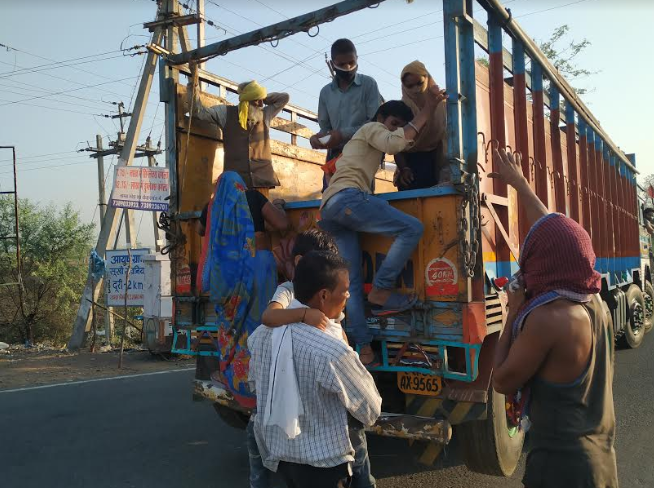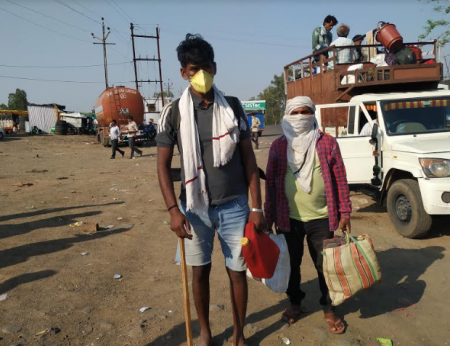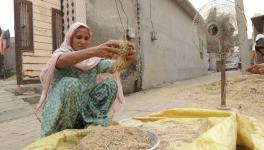COVID 19 Lockdown Has Exposed Major Gaps in Social Protection Systems, Says Report

As the nationwide lockdown to contain the COVID-19 pandemic continues, a study has highlighted the inadequate coordination between the Centre and states as one of the reasons leading to poor implementation of relief measures, funding concerns and delayed response mechanisms for marginalised groups during the lockdown.
A working paper “Human Rights Assessment and Compilation of State Relief Measures” prepared by Shivani Chaudhry, Anagha Jaipal, and Aishwarya Ayushmaan of Housing and Land Rights Network points out the impact of the lockdown on human rights and gap in social protection and human rights along with others.
The report urged that the information related to public funds for COVID-19 relief and recovery, including PM-CARES should be made public and people should be provided with updates on the utilisation of the funds. It also added that any surveillance applications should not be imposed on people either.
Human Rights Impacts of the Lockdown
Though the stringent lockdown measures are important to curtail the spread of virus, the inadequate planning and insufficient protections have had serious impacts on the human rights of a large section of society especially the most marginalised. These include rights to food, health, adequate housing, participation, and right to live with dignity. The most severely affected by the lockdown and resultant loss of livelihoods have been faced by daily wage workers, including homeless and landless people, migrant workers, agricultural labourers, fish workers, and others employed in the ‘informal’ sector, says the paper.
Also read: Covid-19 Exposes Gaps in Indian Laws to Protect Workers
“After 40 days of India’s lockdown, life for the urban and rural poor is overridden with loss of income, hunger, ill health, desperation, destitution, and a rise in malnutrition. Other fateful consequences of the lockdown have been a significant increase in domestic violence against women and child sexual abuse, adverse mental health impacts and psychological stress, disruption in children’s education, and loss of life for reasons other than the coronavirus, including inter alia starvation, denial of medical aid/inability to access medical assistance, exhaustion, and suicide,” the study says.
As of May 4, 2020, 338 people have reportedly lost their lives for reasons related to the lockdown. Because of the absence of official data and unreported cases, this figure is likely to be an underestimation. As the lockdown disrupts many things including the immunisation services for children and cessation of treatment of serious illnesses such as malaria and tuberculosis (TB), and the non-availability of certain medicines during the lockdown have also resulted in serious health impacts.
The migrant workers stand as one of the worst affected- in the absence of social/low-cost housing policies for them, a large majority lived at their work places, including in factories, shops, construction sites, and restaurants, and were thus rendered homeless when the lockdown was announced.
Also, marginalised and vulnerable groups such as displaced persons, children living in the streets, persons with disabilities, older persons, indigenous/tribal and other local communities living in remote areas, single women, transgender persons, and sex workers/prostitutes, while suffering adversely from the lockdown have not benefitted from most relief measures, the report added.
Though the states and Centre mandate that people should stay at home and maintain physical distancing, over 4 million people are homeless in urban areas, and 75 million people live in informal settlements without access to essential services.
Central and State Government Relief Measures
“The Government of India’s Rs 1.7 lakh crore (Rs 1.7 trillion/USD 22.6 billion) relief package— which includes the provision of free rice/wheat and pulses for three months to beneficiaries under the National Food Security Act 2013—has still not reached all eligible families.”
Also read: COVID-19 Lockdown: UP Flower Farmers Forced to Feed Yield to Cattle in Absence of Buyers
Moreover, the package, according to the study, omits a large percentage of the most needy. “The central measures also do not propose sufficient cash transfers or unemployment benefits for the majority of those employed in the informal economy, who have been most severely hit by the lockdown. The Rs 500 being provided to women in their ‘Jan Dhan’ accounts is insufficient to provide relief after all the hardship and financial losses incurred,” it adds.
Gaps in Social Protection and Human Rights
The pandemic and lockdown have to an extent exposed the major gaps in social protection systems, especially with regard to access to public healthcare, social security, adequate housing and need to be addressed in order to derive lessons to move forward. These include, among many others: “failure to provide adequate housing for low-income groups; lack of universalisation and inadequate implementation of the Public Distribution System, which has resulted in acute hunger among many, despite progressive announcements, state measures, and the abundance of food grains in the country; lack of accurate data and failure to document and protect workers in the informal economy, especially migrant workers and homeless persons, with housing, food, social security, and health insurance. The lack of identity documents/government identification documents has also excluded many workers from receiving state benefits, including during the lockdown, whether from construction boards or other government schemes; failure to invest adequately in public healthcare and lack of comprehensive health insurance for those in need.”

As the country is in its third phase of lockdown, there is a need to ensure distribution of essential food items to those who need it, including those who do not hold ration cards. The process for accessing food should be simplified and inclusive, the report suggests.
"Free water supply in all settlements and homeless clusters, and increase in the number of community toilets across the country are need of the hour," it adds. The report also urges that the government should provide the relief measures of food, shelter, financial assistance for protection of vulnerable groups for at least six months after the lockdown ends.
Also read: COVID-19 In Rural India-XXXIII: Villagers from Gijhi Fear Starvation of People, Cattle
Get the latest reports & analysis with people's perspective on Protests, movements & deep analytical videos, discussions of the current affairs in your Telegram app. Subscribe to NewsClick's Telegram channel & get Real-Time updates on stories, as they get published on our website.
























